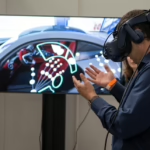Technology has significantly impacted traditional industries, revolutionizing the way they operate and deliver products and services. For instance, the manufacturing sector has witnessed a transformation with the introduction of automation and robotics. These technologies have streamlined production processes, improved efficiency, and reduced operational costs.
Similarly, the retail industry has been reshaped by e-commerce platforms, enabling businesses to reach a global audience and provide personalized shopping experiences. Furthermore, the banking and finance sector has embraced digital innovations such as online banking, mobile payments, and blockchain technology, enhancing customer convenience and security. Moreover, the entertainment industry has experienced a paradigm shift with the advent of streaming services and digital content creation tools.
This has altered consumer behavior and challenged traditional distribution models. Additionally, the agriculture sector has leveraged technologies like precision farming, drones, and IoT devices to optimize crop yields, minimize resource wastage, and monitor environmental conditions. Overall, technology has disrupted traditional industries by introducing new methods of production, distribution, and customer engagement.
Disruptive Technologies: Changing the Business Landscape
Disruptive technologies have fundamentally altered the business landscape across various industries. One such technology is 3D printing, which has revolutionized manufacturing by enabling rapid prototyping, customization, and on-demand production. This disruptive innovation has the potential to decentralize manufacturing processes and reduce reliance on traditional supply chains.
Another example is blockchain technology, which has disrupted the financial sector by introducing decentralized and secure transaction systems through cryptocurrencies and smart contracts. Furthermore, the Internet of Things (IoT) has transformed industries by connecting physical devices and enabling data-driven decision-making. IoT applications in smart homes, industrial automation, and healthcare monitoring have redefined operational efficiency and customer experiences.
Additionally, renewable energy technologies such as solar panels and wind turbines have disrupted the energy sector by providing sustainable alternatives to traditional power sources. These disruptive technologies have reshaped business models, market dynamics, and consumer expectations, driving innovation and competition in the digital era.
The Role of Artificial Intelligence in Revolutionizing Industries
Artificial Intelligence (AI) has played a pivotal role in revolutionizing industries by enabling automation, predictive analytics, and cognitive computing. In the healthcare sector, AI-powered diagnostic tools and medical imaging algorithms have enhanced disease detection accuracy and treatment planning. Moreover, AI-driven chatbots and virtual assistants have transformed customer service in various industries by providing personalized interactions and resolving queries in real-time.
Furthermore, AI algorithms have revolutionized the financial industry by detecting fraudulent activities, optimizing investment strategies, and automating risk assessment processes. In manufacturing, AI-powered predictive maintenance systems have minimized equipment downtime and improved operational efficiency. Additionally, AI has revolutionized the transportation sector through autonomous vehicles, route optimization algorithms, and traffic management systems. The integration of AI technologies across industries has led to unprecedented levels of productivity, innovation, and decision-making capabilities, shaping the digital world in profound ways.
The Rise of Digital Transformation in Various Sectors
Digital transformation has become a strategic imperative for businesses across various sectors to adapt to the evolving technological landscape. In the retail industry, digital transformation initiatives encompass omnichannel strategies, personalized marketing campaigns, and seamless customer experiences across online and offline platforms. This shift towards digitalization has redefined consumer expectations and reshaped the competitive dynamics of the retail sector.
Similarly, the education sector has embraced digital transformation through e-learning platforms, virtual classrooms, and interactive educational content. This has democratized access to quality education and personalized learning experiences for students worldwide. Moreover, the hospitality industry has undergone digital transformation by implementing mobile check-in services, smart room technologies, and data-driven guest personalization.
Furthermore, digital transformation in the logistics and supply chain industry has led to real-time tracking systems, inventory optimization algorithms, and automated warehouse management solutions. These advancements have improved operational efficiency and supply chain visibility. Overall, digital transformation initiatives have permeated various sectors, driving innovation, agility, and customer-centricity in the digital world.
Innovations in the Healthcare Industry: How Technology is Changing the Game
The healthcare industry has witnessed groundbreaking innovations driven by technology, transforming patient care, medical research, and healthcare delivery models. Telemedicine platforms have revolutionized access to healthcare services by enabling remote consultations, virtual diagnosis, and remote patient monitoring. This has proven instrumental in extending medical care to underserved communities and improving healthcare accessibility.
Moreover, medical imaging technologies such as MRI machines, CT scanners, and ultrasound devices have advanced significantly with improved resolution, faster processing speeds, and enhanced diagnostic capabilities. These innovations have revolutionized disease detection and treatment planning. Additionally, wearable health devices and IoT-enabled medical sensors have empowered individuals to monitor their health parameters in real-time, leading to proactive healthcare management and early intervention.
Furthermore, precision medicine driven by genomic sequencing technologies has personalized treatment approaches based on an individual’s genetic makeup, leading to targeted therapies and improved patient outcomes. The integration of artificial intelligence in healthcare data analytics has facilitated predictive modeling for disease outbreaks, treatment response prediction, and population health management. These technological advancements are reshaping the healthcare industry by improving patient outcomes, reducing healthcare costs, and driving medical innovation.
The Future of Transportation: How Technology is Shaping the Industry
The transportation industry is undergoing a transformative phase driven by technological innovations such as electric vehicles (EVs), autonomous driving systems, and smart mobility solutions. Electric vehicles have gained momentum as sustainable alternatives to traditional combustion engine vehicles, addressing environmental concerns and reducing reliance on fossil fuels. The advancements in battery technology have extended the range and performance of EVs, making them increasingly viable for mass adoption.
Furthermore, autonomous driving technologies powered by artificial intelligence and sensor fusion systems are revolutionizing the automotive industry by enhancing road safety, reducing accidents, and redefining urban mobility. These self-driving vehicles have the potential to reshape transportation infrastructure and urban planning by optimizing traffic flow and reducing congestion. Moreover, smart mobility solutions encompass ride-sharing platforms, on-demand transportation services, and integrated multi-modal transit systems that are redefining commuter experiences and urban mobility patterns.
Additionally, hyperloop technology and high-speed rail innovations are revolutionizing long-distance transportation by offering efficient and sustainable alternatives to traditional modes of travel. Overall, technology is shaping the future of transportation by driving sustainability, safety, and efficiency in the industry while redefining mobility experiences for individuals and communities.
The Influence of Big Data and Analytics on Industry Revolutionization
Big data and analytics have emerged as powerful tools driving industry revolutionization by enabling data-driven decision-making, predictive insights, and operational optimization across various sectors. In the retail industry, big data analytics are leveraged to understand consumer behavior patterns, optimize inventory management, personalize marketing strategies, and forecast demand trends. This data-driven approach has transformed retail operations by enhancing customer experiences and driving business growth.
Similarly, in the financial sector, big data analytics are utilized for fraud detection, risk assessment modeling, customer segmentation analysis, and algorithmic trading strategies. These applications have revolutionized financial services by improving security measures, enhancing customer engagement strategies, and optimizing investment decisions. Moreover, big data analytics in healthcare have facilitated population health management initiatives through predictive modeling for disease outbreaks, patient risk stratification analysis, and treatment effectiveness assessments.
This data-driven approach has revolutionized healthcare delivery models by improving patient outcomes and reducing healthcare costs. Furthermore, big data analytics in manufacturing enable predictive maintenance strategies for equipment reliability optimization, supply chain visibility enhancement through real-time tracking systems, and quality control process improvements. These applications have revolutionized manufacturing operations by minimizing downtime costs and improving production efficiency.
Overall, big data analytics are driving industry revolutionization by unlocking actionable insights from vast datasets to optimize processes, enhance decision-making capabilities, and drive innovation across sectors. In conclusion,
Technology continues to revolutionize traditional industries across various sectors by introducing disruptive innovations that reshape business models, operational processes, consumer experiences, and market dynamics. From artificial intelligence driving automation and predictive analytics to big data transforming decision-making processes across industries – the digital world is witnessing unprecedented transformations that are shaping the future of businesses worldwide. As technology continues to evolve at a rapid pace, its impact on industries will continue to drive innovation and redefine the way businesses operate in the digital era.




